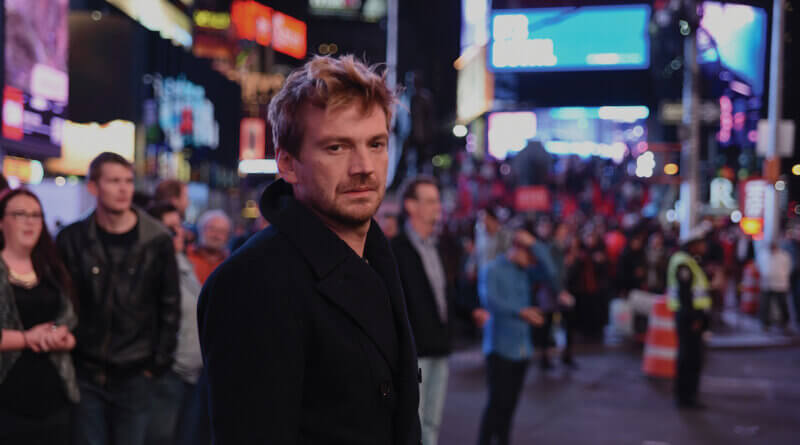Review: Nobody’s Watching (2017) ★★★½
New York City is the place where dreams are made. At least, it’s supposed to be. For years, artists and dreamers have touted NYC as a place of limitless opportunities. This optimistic outlook might work out for some, but for many, the Big Apple is the place where dreams go to die. In Julia Solomonoff’s Nobody’s Watching (2017) or Nadie Nos Mira, an Argentine actor tries his luck in New York City, only to face constant roadblocks and disappointment.
Guillermo Pfening stars as Nico, a recent Argentine expatriate who had a promising career in his home country. However, after a bad breakup with his lover and mentor, Martín (Pascal Yen-Pfister), Nico moves to New York to advance his career. Unfortunately, with few friends and no real connections in the industry, Nico struggles to get work. To make ends meet, Nico works as a male nanny for his friend and fellow Argentine immigrant, Andrea (Elena Roger).
Much like the protagonist in Ana Asensio’s Most Beautiful Island (2017), Nico is an immigrant who struggles to fit into American culture. Like Asensio’s heroine, he also must work menial, under-the-table jobs just to make ends meet. Nico could always turn back and resume his success in Argentina, but he chooses to persevere. With no desire to return as a failure or go back to the man who broke his heart, Nico lives in self-exile and does everything in his power to be a successful actor in the United States.
It goes without saying that Nobody’s Watching (Nadie Nos Mira) is not altogether original. As far back as John Schlesinger’s Midnight Cowboy (1969) — and probably farther — filmmakers have explored the difficulties of desperate actors trying to make it in New York City. However, Julia Solomonoff gives the story a uniquely Argentine flavor, looking at the vast differences between American and Argentine culture.
Like all the films mentioned above, Nobody’s Watching forces the viewer to see the American experience from a realistic vantage point. In an ultra-competitive capitalist society, bills must be paid, deadlines must be met, and opportunities must be grabbed — or else. There’s no room for error, which means that the people with the least have the most to lose. As an immigrant with little money and few friends in the country, Nico is always one step away from disaster.

The frustrating part about Nobody’s Watching is Nico’s ability to change his circumstances. He could return to a promising career in Argentina, but he chooses not do so. Why? Partly to retain his sense of personal freedom; partly to avoid falling back into the arms of the man who wronged him. You’re inclined to sympathize with Nico, but you can’t help but find his reasoning a tad childish. When you consider his financial issues and difficulties finding success in New York, you can’t help but wonder why he tries so hard to make things work.
In any case, Julia Solomonoff’s script is engaging and the performances all work well, but she doesn’t take any risks. Nobody’s Watching checks all the right boxes for its genre. However, you might forget about it one or two months after you see it. This might be a rather unfair criticism. There’s very little wrong with the film. It simply doesn’t stand out from all the other “struggling actor trying to make it in the big city” movies.
That said, it is a very well-made and engaging film. You feel for Nico and want to see him succeed. It becomes stressful to see someone fall on their face over and over again. All the while, Nico tries to pretend as if everything is ok, for the sake of his own pride.
This is perhaps the most uniquely Argentine aspect of the film. Argentinians, as a group, are very proud people — almost to a fault. I don’t want to stereotype, but as someone who has lived among Argentinians for years, I have some insight on the matter. I can say without hesitation that confidence and pride are not in short supply in the Argentine culture.
The pride, confidence, and — at times — the arrogance of Argentine culture is an important part of Nico’s character. It’s not just that he wants to succeed; it’s that he’s mortified of admitting defeat or losing face in any way. To return to Argentina is to admit that he made a mistake. To admit that he made a mistake is to be a fool.
Julia Solomonoff’s Nobody’s Watching (2017) is not an inspiring film, but it is very well-made. It only falls short insofar as it is a story that, by and large, has been told before. However, if you are a fan of Argentine cinema or tense dramas, Nobody’s Watching is a great watch (pun intended).
Rating: ★★★½ out of 5
If you’d like to watch Nobody’s Watching (2017), the full movie is currently available to stream, rent, or purchase via Amazon. For more film reviews like this one, consult the Philosophy in Film Homepage!

